Hello and welcome to Episode 13 of the What China Wants podcast.
When the world thinks of China, it thinks of the flashy, prosperous East and South coasts - Shanghai, Beijing, Shenzhen. But the majority of Chinese live a very different life, stuck in poor rural areas with limited access to education, healthcare, and jobs.
Is this bulk of humanity, numbering 1/9 of the world’s population, a drag on the country that will disrupt the country’s development? Or is it an eminently solvable problem?
To discuss this we are joined by one of the foremost developmental economists on China, Scott Rozelle from Standford University, and the author of the incredible book Invisible China. (I can honestly say it is one of the most eye-opening books I’ve ever read on the People’s Republic, and I’ve read a few.)

You can also listen to the podcast on Apple, Amazon, or Spotify.
As always please do share, comment, and subscribe. We’ll be back next week with more What China Wants.
Many thanks for listening.
***
Here is the transcript:
Sam Olsen: "As of 2015, fully 70% of working age adults in China were high-school dropouts. This leaves China's population less educated than the population of any other middle income country, and even worse off than that of many poor countries."
That, as I'm sure you'd agree Stewart, is a staggering statistic to start off the latest episode of What China Wants with Sam Olsen and Stewart Paterson, and it is something which should be of chronic interest to Beijing, if they're trying to keep their country on the straight and narrow path of development.
Joining us today is the author of these words, Scott Rozelle from the University of Stanford in America and one of the world's leading experts on the development of China. Welcome, Scott.
Scott Rozelle: Thanks, Sam. Thanks, Stuart, it's always good to have the interaction with you looking forward to it.
SO: To start off, I just want to mention that this quote comes from your book, 'Invisible China'. What do you mean by 'Invisible China'?
SR: Well, 'Invisible China' is the China that we don't see. It's not the Beijing, Shenzhen or Shanghai, that is on the news, or that people go visit, that the businessman visits or the tourist visits. One out of nine people in the world are rural Chinese; that means that they have an identification card that says, 'I was born in a rural area', and it means that's, that's where they're going to live their life in terms of social welfare, education, health. They can move and migrate to work, but they have this entire set of access to the social services that are inferior than somebody from urban China.
Stewart Paterson: Actually, Scott, can I just pick up on that? So what sort of proportion of what we call 'rural Chinese', as they are designated as such, actually now live in rural areas? We seem to have three demographics here; we have 'urban Chinese', 'rural Chinese' and 'rural Chinese who are living in urban areas'.
SR: Exactly, and China actually has two different sets of census data. One is, on the day, they took the 2020 census and the 2010 census, 'where did you live?' and today, about 50-60% of Chinese, of 1.4 billion people, are living in urban areas, and 40% are still out in the rural areas. But when you look at the 'hukou', or the 'residency', it's the exact opposite - 60% are rural - which means that there are probably 250-300 million migrants and then their families sometimes if they are able to bring them with them.
So with these migrants, they are from a rural area, but they are living in urban areas. They're like a guest, though, as they can't live there and take their kids to public school there. They cannot get public health services there, and so they are like second-class citizens, although they are supplying the labour for manufacturing, construction services, etc.
SP: Scott, looking at that, what sort of traits mark them out as different from the urban population in terms of socio-economic metrics? Sam, in the introduction mentioned education, perhaps we could go into that a little bit? But presumably, also, there's a big income difference as well, and maybe even life expectancy and that kind of thing.
SR: Yes, so certainly education is where the biggest difference lies. If we look at the whole labour force, that's everybody aged between 18 and 65. It's what Sam said, that China only has 30% of its total labour force of about 800 million people, that have ever been to one day of high school. Only about 10-15% of rural people have ever been in high school in this whole labour force. The elderly in the labour force, those aged 50-65, they almost never went to high school. Younger kids are going more often, but much, much less than in urban areas. And when you look at college, a small fraction of rural people, about 10%, have ever been to a day of college while it's probably around 50-60% of urban people that have been so it's a huge difference.
There is a great set of papers now by Terry Sicular, who is an economist up at Western Ontario University, and her colleagues, that looks at the income side of things. On the one hand, she says 'look at China, it has the fastest growing middle-income population in the world'. It has 350 million people and there are more middle-income people in China than there are people in the US, but they're almost all urban. So, using an international definition of middle-income, this rural population is 90% low-income.
Even the Premier of China says, "We have 600 million people, and half of our population lives on $5 a day or less, and that's low. 900 million live on $10 a day or less, and they're almost all rural, there are very, very few low income, urban people. So it's two different worlds out there, and the reason why we don't know this is that they're invisible. They work in the factories, they work in the construction towers, they then go home and live in the alleys and in the basements when they're in the urban areas, or they live out in these villages that are just, you know, off the track. When you go from Beijing to Shanghai, you fly there, or you take the high-speed rail, you don't even see this part of China.
SP: So Scott, this is obviously not part of the narrative that the Communist Party likes to promote, or publicise in terms of their achievements. And the Party do make a big song and dance about the poverty reduction achievements over the last 40 years or so. It's indisputable that in urban areas, certainly, China has had something of a miraculous growth trajectory, and a lot of the damage that the Party did prior to reform has been undone in the urban areas, and in aggregate, China now enjoys sort of middle-income status as it were. After its economic miracle, it's average in a global context.
But concerning the degree to which the rural population have been left behind, as you've just articulated, how do the rural population interpret their circumstances relative to the urban population? Who do they blame for it? And are they even aware of the huge gulf that exists between them and the urban population? Because it sounds to me like politically, it's quite a volatile set of circumstances to tolerate.
SR: Yes, I think this is at the heart of the question, and it's what is changing too. First of all, you can't take anything away from China, they have grown, and they have got rid of poverty, most of it, anyway. As I said, they have now moved from poverty to low-income.
But to your question, I think the work by my colleague, Marty Whyte, who is a Professor Emeritus from Harvard. He's a sociologist, and for 20 years from the 1990s to 2010 or so, Marty would go and say, "Do you know that China's unequal?". He would be asking these people at the bottom in the spectrum, and they would say, "Yes", because they are washing the windows of the Mercedes Benz, of the urban guy, right? He says, "of course, I know". Well, he says, "Well, what do you think about that?" And what Marty said is that for at least 20 or 30 years from the 80s, to through the early 2010's, people would say, "I know it is unequal. But I'm better off than my parents were, when they were this old. I'm better off 10 years ago to now." And then they'd say, "and I think I'm going to be better off 10 years from now". So that kept the glue together as inequality rose.
The problem is I have a set of papers now called 'The emergence of polarisation', and what we see now is the change of access to the foreign labour market, which was new in the 80s and 90s, and then the rising wages, which was for the first 15 years of the 2000s. Now we start seeing it reversing, and what is happening is manufacturing is falling and construction, labour is falling. Everybody is getting dumped into the service sector, and guess what, it's an informal service sector. They are not covered by labour laws completely, they don't have access to social services. And of course, if you have a billion people who are low-income, they don't consume services. And so what we're getting is we're getting this supply of people into the informal labour service sector, but the demand isn't growing fast enough so wages fall.
That's what's been happening over the last five years, we start to see the wages, at least the growth rate of these wages fall. It is now regularly below a falling level of GDP growth, and I don't see what is going to turn that around. They are starting to tell us this. In fact, in Marty's last survey before 2019, the people in this lower income tier said "I'm worried about the future", just for the first time. "What am I going to do?" So I think that we may be at this turning point when a large share of this population is going to start saying, "do I want to keep plugged into the system and go along with it or do I want to try to go against it?" And that's what we're on the edge of, I think.

SO: So Scott, I suppose one of the things that Stewart and I have been speaking about amongst ourselves, but also with people like George Magnus, is the fact that China's economic model is changing, it has to change, because we're now getting to the end of the huge development process that they've been going through. People are being laid off from the infrastructure projects, which are now coming to an end, and huge amounts of building, this happened over the last 50 years is now coming to an end.
So a lot of these people are going to struggle, especially if they don't have the proper education, which again, is at the centre, I think, of the hypothesis that you make in Invisible China. These people are not well educated, and they are going to find it very difficult to help China move up the value chain. In fact, I seem to remember from previous conversations, that you were saying that evidence of the fact that China is changing its economic model is that people - men in particular - are moving back to villages, which have been empty of young men for generations, because they have all been going off to the city to earn a crust. So what does this changing economic profile, coupled with lower education and problems in rural China mean for social issues and the development of China as a whole?
SR: Well, I think, first of all, we should note we haven't been there in three years, and these are three years when the unemployment or underemployment has only been made worse by COVID, and by some of the policies that, you know, that the government has followed. We see that the newspapers in China are full of reporting the rise in unemployment of young urban people. Guess what, no rural person is unemployed, zero. That is because every one of them has land, and as soon as they lose their job in a factory or lose their job in a construction site, they're a farmer again. Of course, they have never farmed, and their income is very, very low on that farm. And so I know that from our surveys, right after the early time to COVID, is that there were tens of millions of families that had lost their job or they were still working, but their wages were much lower.
I think about what is going to happen with those guys. Well, there are a couple of scenarios. I think most of them are going to tighten their belt, work as hard as they can, try to make it. But I think there's going to be a subset of them that we talked about last time, Sam was who think "I don't have a wife, I don't have a family, and I'm poor." They can get to a point where they think "what do I lose from going into the informal sector?" We call it the organised crime sector or the dark-side sector, and I think that we're going to see more and more of that.
On the other hand, China has invested a lot into facial surveillance technology and into building a big police force, so I think that they know that that's coming. I think that this is going to be something we should watch really closely over the next 5-10 years. It's an important question that that's going to determine a lot for China, I think it's going to determine, whether China can keep itself on this even keel, or is it going to go down more? Or can it miraculously recover and keep 5-6% growth?
SP: Scott, maybe we can come back to that in a minute, but I just wanted to pick up on something you said about land ownership and the rural population and the kind of safety net that potentially that provides, or at least, a safety net from being categorised officially as being unemployed. Presumably, as China's urbanisation has run its course, the geographical definition of an urban area has changed as the cities have grown to subsume large parts of what was previously countryside. I wanted to just ask you about two factors in that.
One is, when we talk about an urban population, i.e. having an urban registration, has the area in which being born into an urban area changed to take account of rural areas that have been subsumed into urban districts? That was my first question. My second question, which is linked to that is presumably a lot of former rural members of the population do not have land because it was bought by the property developers, stolen by the property developers or the local governments for residential development. I was wondering how much of a source of discontent that was?
SR: Yes, I would say three things to that, I'll try to go through them quickly. First of all, is land really a safety net? I think it's a safety net. I think it's a real, real, real low safety net. So we did a survey at a factory, with a lot of people working at it. We surveyed 20,000 people. These were young workers, mostly between 15 and 30 years old. We asked them "what are you going to be doing 10 years from now?" 10% said, 'I'm still going to work in the factory'. 1% said, 'I can go get a white collar job'. 1%. For reference, in South Korea and Taiwan, when the factories shut down, and they moved their factories to China, the population all had high school or higher levels of education, even the workers did, and they moved into white collar jobs. But only 1% of this rural labour force said 'I can move into that' 88% said, 'I'm going to go and be in the informal labour service sector'. They basically said, 'I want to work for myself', gè tǐ hù (个体户), self employed. If you add all those things up, right, only 1% said, 'I'm going to go back and farm'.
We then asked them, 'Why aren't you going to go farm?' These are 15-30 year olds; about 90% said, 'I've never farmed one day in my life. I don't know how to farm', that's number one. The second response was 'I make more money in three weeks than my dad makes in an entire year on that farm. Do you think I'm going go back and work hard for three weeks of wages?' They said 'no way'. So that's what I'm talking about. This is a very, very low safety net. The second set of questions was about this Peri urban area, so people who have lost their land. It was a big issue in the 90s and early 2000s. In fact, since that time, when they take land away from farmers, they do not want to have big protests or anything, so they actually do give them a lot. They build apartment buildings and often give them two apartments. So they lose their land, but they have two apartments. They live in one, and they rent the other one out.
I always say, 'hey, they have become an urban person'. But what we find is, the way they raise their kids, the way they manage their health, the way they eat, the way they raise their babies, is that you can say 'I can take the boy out of the country, but I can't take the country out of the boy.' They're basically rural people with urban residencies, that live in urban areas, but they still act like rural people. Now, I think that after a generation or so they're going to be changing but this first generation really are urbanised rural people who are still rural people. And I think that the problems that come with them are going to show up.

And by the way, lots of people say, 'Oh, wow, so many people have got their land taken away from them'. China's only lost 2-3% of its farmland to urbanisation over the past 15 years. 98%, the rest of the land, is still out there. A small fraction will continue to be developed, but most of it will be farmland forever. And so I'm sure these guys in the middle of Henan and Anhui and Sichuan, they would love somebody to go buy their land from them, but nobody's going to buy it.
SO: So Scott, much as we're enjoying this conversation, and it's quite an academic conversation in many ways, but we have a lot of policymakers and business people listening to this, who wants to know more about China. The question that they will be asking is, why should we in the West care about the Invisible China and about the people that haven't got an education that are living in sort of, quite poor areas? Does that make any difference to China's economic prospects? Does it make any difference to Chinese policy regarding their movements overseas and their actions overseas?
SR: Well, I think that it makes all the difference in the world in terms of growth. What Invisible China says is, the probability of China basically stagnating or collapsing or just not growing fast anymore is very, very high. One of the reasons, there are other reasons, but one of the reasons is because of this very large, unemployable in a high-income, high-skilled economy, part of their labour force. The question is, you know, what do you do? What do you do with 500-600 million people that have never had one day of high school education? How do you move them up to a high-income country? Either, you have to give them massive social welfare payments to keep them from causing social problems. China has big fiscal problems now, especially as they're trying to maintain their military, they're doing Belt and Road, they're trying to go to the moon. At the same time they have this gigantic, you know, rural population that's income is falling. And it's going to do two things. I think there is absolutely going to be a rise of huge social problems, including crime, and that's going to divert resources from other places to try to manage that. It's also going to discourage investment.
The second thing is, is if China wants to try to depend on its own economy for growth, their policy is dual-circulation economy, the 900 million people living on $10 a day are not a source of growth, and they don't have the education to become high-income over time. I think if they don't go into crime, they're going to go into the informal sector. And just like Mexico, just like Brazil, just like Colombia, just like South Africa, the rise of this informal sector actually becomes an anchor on the formal sector. It competes against them, it pulls them down, and I think that that's the real danger that China is facing. How does a no-growth or a negative-growth China, how do they act internationally? That's not my field. But you could look at what happens when the Russian economy doesn't grow for a long time, look what happens in Ukraine. That's why I think people should at least worry about that. What can we do about it? It's a tough issue.
SP: Scott, just very quickly, one last question here. Xi Jinping and the hierarchy of the party must be well aware of these social problems. How much of a priority is it for them? We have come to expect things to be prioritised as and when they pose an existential threat to the Party's power. Are we at a stage now where rural policy is being elevated through the to-do list? And what might we expect Xi Jinping to do about it?
SR: Well, I think that they do recognise there is this problem. Sometimes I don't think they realise the real root of the problem. So they create more vocational high schools to get more kids in high school. But since the kids didn't have very good elementary school education, and there's very low quality preschool education, there's no 0-3 year old parental training. So you're raising a whole generation of 'farm boys' who do not have the cognitive ability to go into the high skill, or even academic high school or above where you need computers and science and math and language abilities. That's where they have to start, so number one.
Number two is they say, let's use urbanisation as a mechanism. I think that's one thing they've been saying. And of course, they want Beijing for Beijingers, and Shanghai for Shanghaiers. So they're going to create, they're going to take county seats. I don't know if you've seen this new policy but what they're talking about is getting rid of this hukou for small cities, for cities under 3 million people. Basically what they want people to do is to go back to the small cities in the middle of the countryside. I often say is, China has 2,000 counties. We have 2,000 counties in the US too. What one of China's plans for urbanisation is to take those 2,000 county seats and turn them into 200,000 person cities. So they want 2,000 200,000 person cities, but who's gonna live in them? China has 300 million people that are middle-income. They live in Shanghai, Shenzhen, Beijing and Guangzhou, right? You're going to populate these 2,000 county seats with 200,000, low income people. Well, you are not going to do manufacturing out there. You're not going to be doing a construction after a while. They aren't going to consume services so I think you're making 2,000 basically slums over time.
So they say we're going to use urbanisation. We're going to expand high school, but they don't get at the roots of the problem. And I think that that's really what it's going to come down to. And as we've seen with so many of these middle-income countries, they grow, grow, grow from poverty to middle-income, and then they stagnate. But we've never had a country as big as China stagnate. We've never had a country with this big of an army is China. And I think it's going to be a real challenge for the world.
SO: Well, Scott, thank you so much for a tour de force of the issues surrounding Invisible China as your book title indicates, really good to hear. And I must say that of all the books I have read on China and the challenges that they face, yours really stands out as being perhaps the most apocalyptic simply because of the scale of things. I just hope it doesn't end up that way.
SR: Yes, well I wrote this because I want to bring this to the attention of people. I don't want China failing. I want them to participate fairly with transparency right in the international order, because I think a steadily growing fairly open China is great for the world and it's great for China, and it's great for Asia, but that's not the way we're going.
SO: No, sadly, not.
SP: Scott Rozelle, thank you very much indeed.






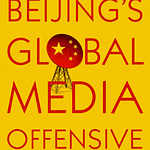
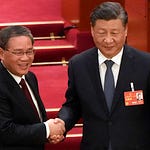
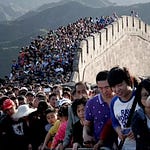



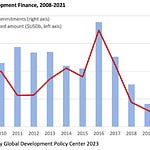
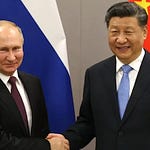
Episode 13: The Dangers from Invisible China